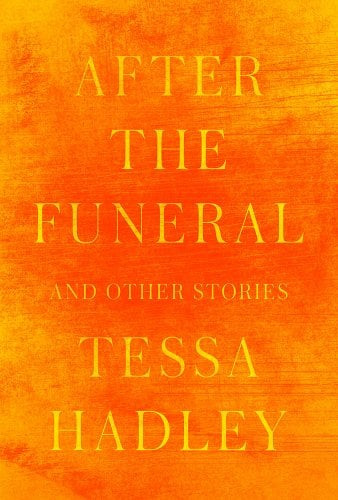Stories of Family Life Shine in Tessa Hadley’s ‘After the Funeral’

After the Funeral and Other Stories
By Tessa Hadley
Knopf
240 pages
In her new collection, After the Funeral and Other Stories, Tessa Hadley excels at describing small details, the way light falls in a room, the substance and texture of family life. This blends wonderfully with the characters she creates—smart women, sometimes attractive, sometimes indifferent about their beauty—and their busy inner lives. Her stories, if read too quickly, can seem to move in slow-motion. But read these pristine sentences more closely, and you’ll see just how much is really going on.
When it comes to setting mood, for example, no one’s better than Hadley. In “The Other One,” friends gather for a dinner party in the English countryside:
“It was a late summer’s evening, and dinner began with white wine outdoors in a small, brick-walled garden, its smallness disproportionate to the dauntingly tall back of the terraced house, built on a steep hill in Totterdown; there were espaliered apple trees trained around the garden walls. The guests’ intimacy thickened as light faded; birds bustled in the dusk amongst the leaves, a robin spilled over with his song, Venus pierced the evening sky.”

In several stories, Hadley plays fast and loose with point of view. This may be jarring at first, but readers soon understand there are further twists in perspective yet to come. In “Men,” the point of view flits from one character to another before settling on Michelle, who works in a high-end restaurant, and Jan, Michelle’s long-estranged younger sister, whose hair is “old-gold color, a silky cut, feathered onto her shoulders.”
Like most of the fiction in After the Funeral, it’s a near-perfect story of sadness, avoidance, and the lifelong curse of broken families.
Male characters in these stories often come across as blustery and self-absorbed, none more so than Frank, in “Old Friends,” a charismatic but distant father. It’s also true about the newly deceased airline pilot in the powerful title story, whose two young daughters “preferred it when he was away working; being alert little girls, they’d picked up intimations that he preferred it, too.”

Time and again, these men demonstrate scant interest in the dramas swirling around them (they’re too busy churning out dramas of their own). It’s the women who struggle with the passage of time and betrayals by friends or family members, all against a pervasive backdrop of decay and death.
Occasionally, in some of Hadley’s stories, there’s rather more telling than showing. Even then, the “telling” is beautifully rendered. In “Cecilia Awakened,” the title character’s oddball parents are ill-equipped to cope with the modern age:
“It was as if the past in some sense belonged to them, because they knew about it and understood it, whereas in the present they were submerged among so many alien others, such hostile cross-currents, in such oceans of what was crass and wrong.”
In “The Bunty Club,” one of the strongest stories here, three sisters in their 50s gather at their mother’s home, switching off visits to her in the hospital. Each character is distinctly drawn, each with their own dwindling hopes and regrets, some still tethered, however implausibly, to an abusive domestic situation. A contretemps over whether to cut back the grass in their mother’s garden—aided by discovery of artifacts from a secret childhood club of their making—causes the women to tumble into the past.

In “My Mother’s Wedding,” a 17-year-old misfit and bookworm named Janey narrates events. Her free-spirited mother is about to marry Patrick, some 20 years younger than her, and Janey says she’s OK with it. Things turn out otherwise, and the farce that ensues is warm, heart-wrenching, and somehow consoling as well. As stated at the story’s outset, “It was never going to be the ordinary kind of wedding.” (Hadley is very good at story beginnings and endings.)
Any new publication by this British novelist and short-story writer is cause for celebration. And if After the Funeral doesn’t quite live up to the brilliance of craft on display in Bad Dreams, her prior collection, Tessa Hadley is still a writer to whom readers should flock, for the elegance of her prose and her unsentimental insights into human nature.
Author Bio:
The Confessions of Gabriel Ash, a novel by Lee Polevoi, Highbrow Magazine’s chief book critic, has just been published.
For Highbrow Magazine
Image Sources:
--Jessica Berger (Pixabay, Creative Commons)
--Knopf
--Alexander Grey (Pixabay, Creative Commons)
--Mabel Amber (Pixabay, Creative Commons)































































































































































































































































































































